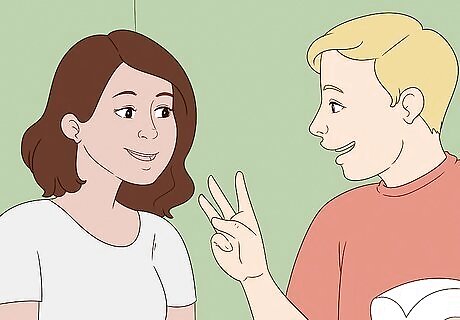
views
Setting the Stage for Love

Be patient. Remember that love doesn't always happen at first sight. Give yourself the chance to feel comfortable with the person. Notice the stirrings of affection as they bloom within you, slowly, like the coming of spring. Separate love from lust, and try to truly appreciate a person.

Let yourself be vulnerable. You may find it hard to truly love someone if you don't allow yourself to be honest and authentic around them. Open yourself up by sharing your dreams, your fears, your doubts, and your joys with this person. Create a genuine and powerful human connection. It can be terrifying to open yourself up in this way, but be brave. Show the person your scars, your tears, your deepest thoughts – though perhaps not all at once.

Focus on the best parts. People are complicated, and you can be simultaneously attracted to and repelled by the various aspects of someone's personality. It will be much easier to love them if you fix your attention on the positive things rather than the negative things. If the negatives are relatively minor, then this might be a good decision. If the negatives are honest-to-goodness deal-breakers, however, then it may be unwise to ignore them.

Fake it until you make it. Some research suggests that the act of pretending to be in love with someone can actually trigger true feelings of intimacy and connection. If you feel comfortable doing so, try to act as though you are in love with this person. Use your imagination and see where it takes you. Be careful with this one. Make sure you do not pretend for so long that you lose your way. Do your best to live authentically. This method may be more effective if the other person is doing the same thing. It can be hard to foster love unless both parties are fully engaged.
Building Intimacy Together

Use the Aron 36-question method. Arthur and Elaine Aron are social psychologists who have spent nearly 50 years studying how and why people fall in love. Through their research, the couple developed a list of three dozen questions that can purportedly foster deep intimacy between two people in a lab setting. These questions may not solve your problem – but the method has also been shown to rekindle the romance in long-term couples and spark a connection between relative strangers.

Ask each other the first set of 12 questions. Explain the experiment to your partner or the person with whom you want to fall in love. Agree that you will commit to sitting down together until you've answered all 36 questions. The whole process should take a few hours. Given the choice of anyone in the world, whom would you want as a dinner guest? Would you like to be famous? In what way? Before making a telephone call, do you ever rehearse what you are going to say? Why? What would constitute a “perfect” day for you? When did you last sing to yourself? To someone else? If you were able to live to the age of 90 and retain either the mind or body of a 30-year-old for the last 60 years of your life, which would you want? Do you have a secret hunch about how you will die? Name three things you and your partner appear to have in common. For what in your life do you feel most grateful? If you could change anything about the way you were raised, what would it be? Take four minutes and tell your partner your life story in as much detail as possible. If you could wake up tomorrow having gained any one quality or ability, what would it be?

Move on to the second set of questions. Once you have each answered all of the first 12 questions, reevaluate the experiment. If you're still feeling comfortable with this person, continue to the next 12 questions. Be aware that the questions are designed to gradually prompt deeper and more personal answers. If a crystal ball could tell you the truth about yourself, your life, the future or anything else, what would you want to know? Is there something that you’ve dreamed of doing for a long time? Why haven’t you done it? What is the greatest accomplishment of your life? What do you value most in a friendship? What is your most treasured memory? What is your most terrible memory? If you knew that in one year you would die suddenly, would you change anything about the way you are now living? Why? What does friendship mean to you? What roles do love and affection play in your life? Alternate sharing something you consider a positive characteristic of your partner. Share a total of five items. How close and warm is your family? Do you feel your childhood was happier than most other people’s? How do you feel about your relationship with your mother?

Answer the last set of twelve questions. By now, you should be deep in conversation with the person. You may feel a powerful and intimate connection, or you may just feel quite comfortable talking to them. If you're still feeling positive about the experiment, move on to the third set of questions and settle in for an even deeper emotional experience. Make three true “we” statements each. For instance, “We are both in this room feeling ... “ Complete this sentence: “I wish I had someone with whom I could share ... “ If you were going to become a close friend with your partner, please share what would be important for them to know. Tell your partner what you like about them; be very honest this time, saying things that you might not say to someone you’ve just met. Share with your partner an embarrassing moment in your life. When did you last cry in front of another person? By yourself? Tell your partner something that you like about them already. What, if anything, is too serious to be joked about? If you were to die this evening with no opportunity to communicate with anyone, what would you most regret not having told someone? Why haven’t you told them yet? Your house, containing everything you own, catches fire. After saving your loved ones and pets, you have time to safely make a final dash to save any one item. What would it be? Why? Of all the people in your family, whose death would you find most disturbing? Why? Share a personal problem and ask your partner’s advice on how they might handle it. Also, ask your partner to reflect back to you how you seem to be feeling about the problem you have chosen.

Gaze into each other's eyes. Research has shown that deep, sustained eye contact can go a long way toward establishing intimate feelings between two people. Eye contact alone may not make you fall in love with someone, but it is certainly a piece of the puzzle. If you want to grow closer with someone, suggest that you try to look into each other's eyes for four minutes straight. If you don't feel comfortable stating your intention, try to make meaningful eye contact whenever you can – ideally during a conversation or during an intimate moment.
Hedging Your Expectations

Be honest with yourself. Consider why you want to be in love with this person, and make sure that you want to do so for healthy reasons. Remember that you do not need to love someone just because they love you. Do not try to force love for the sake of convenience, or social propriety,

Understand the complexity of love. Love comes about through a series of variably conscious and subconscious choices. The intense feelings of attraction and attachment are the product of subtle hormones and pheromones – chemicals that act behind the scenes and make us more or less likely to fall for someone. On some level, you may be able to set up the right conditions for love. On the other hand, the actual feelings may be beyond your control. Try to keep perspective. Study love. Understand why people in love feel the way they do: how attraction and intimacy fire up the dopamine and serotonin receptors in our brains and make us emote so intensely. If you know the science of love, you might have a better idea of how it comes about.

Make sure that you want this. Perhaps you have fallen out of love with a long-term partner, and you want to rekindle the romance. Are you doing this because it is what you want, or are you doing it for the sake of stability: children, friends, or a mortgage? Perhaps you have been set up with an arranged marriage, or you have fallen into a serious relationship with someone that you aren't sure about. Social consequences aside, remember that you do not need to make yourself love anyone! Give yourself permission to honestly and organically discover the love that you deserve.



















Comments
0 comment